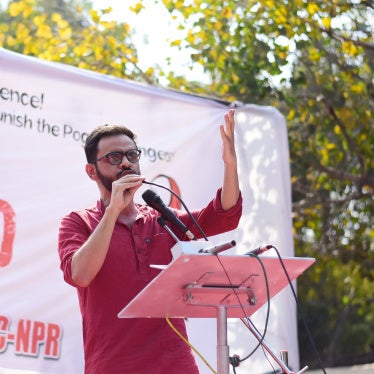(Bangkok) – The Cambodian government stepped up its crackdown on political opposition members and activists over the past year, Human Rights Watch said today in its World Report 2020.
At one point the government held nearly 90 political prisoners throughout the country, mostly people linked to the court-dissolved Cambodia National Rescue Party (CNRP). From January until mid-2019, the authorities ordered over 150 court and police summonses against CNRP members and supporters.
“The Cambodian government’s crackdown on the political opposition kicked into overdrive in 2019, resulting in dozens of wrongful detentions,” said Phil Robertson, deputy Asia director at Human Rights Watch. “Prime Minister Hun Sen’s repression of the opposition, media, and activist groups has effectively turned the country’s democracy into a one-party state.”
In the 652-page World Report 2020, its 30th edition, Human Rights Watch reviews human rights practices in nearly 100 countries. In his introductory essay, Executive Director Kenneth Roth says that the Chinese government, which depends on repression to stay in power, is carrying out the most intense attack on the global human rights system in decades. He finds that Beijing’s actions both encourage and gain support from autocratic populists around the globe, while Chinese authorities use their economic clout to deter criticism from other governments. It is urgent to resist this assault, which threatens decades of progress on human rights and our future.
After exiled CNRP leaders announced that they would return to Cambodia on November 9, local officials brought spurious charges against over 100 former CNRP members and supporters, including plotting a coup, incitement, and discrediting judicial decisions; authorities jailed 65 of them.
The government put in place measures to block the CNRP’s return, including placing military units at Cambodian-Thai border checkpoints, issuing orders to arrest CNRP leaders, sending arrest warrants to 10 ASEAN countries, and instructing airlines to bar CNRP leaders from boarding flights to Cambodia.
On November 10, authorities lifted highly restrictive conditions of judicial supervision, amounting to house arrest, on the CNRP leader, Kem Sokha, though the politically motivated treason charges remain. Hun Sen made clear that Sokha’s case was going to trial, and that proceedings “will not only take a day or two, or a month or two – it will take a long time.” On December 2, the Phnom Penh court ordered the case to proceed to trial.
On November 14, Hun Sen announced that 72 detained CNRP members and supporters should be released on bail; 74 were released. However, none of the criminal charges against them were dropped.
The European Union initiated a formal review of Cambodia’s Everything but Arms (EBA) trade preferences. The EU’s confidential preliminary conclusion, sent to the Cambodian government on November 12, stated that Cambodia seriously and systematically violated the right to freedom of expression and other civil and political rights, and failed to protect labor rights.
“The EU sent Cambodia a clear signal that keeping EU trade benefits meant reversing recent repressive measures and revoking rights-abusing laws,” Robertson said. “Other foreign governments and donors should join the EU in pressing the Cambodian government to act, starting with the immediate and unconditional release of all detainees being held for the peaceful exercise of their basic rights.”









